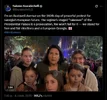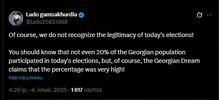Ainakin presidentinpalatsin sisäpihalle pääsi porukka ymmärtääkseni. Ja Ivanishvili on puolueen toimistosta evakuoitu kesken "paikallisvaalien voiton" juhlintaa.
Install the app
How to install the app on iOS
Follow along with the video below to see how to install our site as a web app on your home screen.
Note: This feature may not be available in some browsers.
You are using an out of date browser. It may not display this or other websites correctly.
You should upgrade or use an alternative browser.
You should upgrade or use an alternative browser.
Tässä siitä mitä eilen tapahtu. Vaikka tosiaan ilmeisesti evakoitiin tärkeitä henkilöitä varmuuden vuoksi turvaan, ei väkijoukko sentään rakennuksiin sisään päässy. Rauhallisen vallankumouksen julistaneet johtajat oli ehdottomasti sitä vastaan, että valtauksissa käytettäisiin väkivaltaa. Nyt on 5 pääorganisoijaa pidätetty. Myös Salome Zourabichvili laitto eilen lausunnon, jossa oli väkivallan käyttöä vastaan. Vielä en oo nähny viitteitä, että tuolla 1990-1992 hallinnon ulostulolla olisi tämän kanssa tekemistä. Tuon hallinnon puolustusministeri kertoo, että korkeintaan 20% eilisissä vaaleissa äänesti.

 threadreaderapp.com
threadreaderapp.com

 threadreaderapp.com
threadreaderapp.com



Thread by @64project_ on Thread Reader App
@64project_: On October 4, Georgian Dream held local elections boycotted by almost all opposition parties. Only two, who were originally part of the protest movement, decided to still participate even though polls s...…

Thread by @tweet4Anna_NAFO on Thread Reader App
@tweet4Anna_NAFO: 🇬🇪🇺🇦🇪🇺🇷🇺 Georgia is fighting for its future — and Russia is terrified. If Moscow loses Tbilisi, it loses far more than a former Soviet republic. It loses its grip on the Black Sea, the Caucasus,...…


arix
Respected Leader
Naiivia typeryyttä, ei ryssän kätyrit suostu vallanvaihtoon ilman väkivaltaa...Rauhallisen vallankumouksen julistaneet johtajat oli ehdottomasti sitä vastaan, että valtauksissa käytettäisiin väkivaltaa.
Solidsnake
Respected Leader
Jos ryssän kätyreille tehdään ceausescut, pidettäköön sitä väkivallattomana vallan vaihtumisenaNaiivia typeryyttä, ei ryssän kätyrit suostu vallanvaihtoon ilman väkivaltaa...
Läntisen tuen maksimoimiseksi on ikävä kyllä tarpeen varmistaa, että väkivallan aloittaa selkeästi ja kiistämättömästi ryssähallinto, kohdistettuna rauhallisiin mielenosoittajiin. Viattomien veren virratessa pitkin katua länsikansalaisten kännyköiden näytöillä voi sitten hanskat ottaa pois kädestä ja tehdä sen mikä tarvitsee tehdä.Naiivia typeryyttä, ei ryssän kätyrit suostu vallanvaihtoon ilman väkivaltaa...
Kaksi mielenkiintoista kirjoitusta liittyen lauantain tapahtumiin. Toinen on georgialaisen päättely, että lauantaisen suurmielenosoituksen takana olisikin ollut venäjä joka yritti provosoida väkivaltaisuuksia hyväksikäyttäen georgialaisten kipupisteitä. Toinen on taas tätä päätelmää tukeva venäläisen ihmisoikeusaktivistin haastattelusta. Venäjän tavoitteena olisi toistaa Minsikin 2020 skenaario.
Today, with a clear head, as I reassess all the leaks we saw before October 4, everything we witnessed that day, and the small comment by one of the organizers about treason and never trusting people with big resources, I’m left with only one conclusion:
It was a Russian special operation, a planned framing designed to finally kill the protest and formally seal the dictatorship. It was one of the biggest PsyOps I’ve ever seen with my own eyes. And yes, unfortunately, it even low-key worked on me.
When I write this, I’m not saying that any of the official organizers directly conspired with the FSB or its local arm, the SSG. What I mean is this: these were people whose egos sadly outweighed their IQs, and Russia saw that, picked them up, played them, and used them.
Our biggest problem is that nobody knows Georgians, our triggers, our traumas, better than Russia does. And they play us every damn time.
But again: #GeorgiaProtests will continue. It will be 100% harder now than it was yesterday, but the fight continues until there’s no one left to fight.
It’s not over until we say it’s over.
Months ago, one of my foreign friends, someone genuinely invested in Georgian politics, told me: “You know what, guys? Your problem is that you always blame Russia for everything.”
Yes, we do. Because in 99 out of 100 cases it is the Kremlin behind it. And the fact that we, as a society, are weak enough to let them fool us again and again is itself the result of centuries of Russian oppression — an oppression that literally murdered Georgian intelligentsia or forced them into exile, leaving the country in the hands of people either not truly capable or with easily bent principles.
We’re sorry we can’t compete with a power ten times bigger than us, or with countries that have long-standing ties with Europe and managed to build strong civil societies. We’re sorry.
Russian-born human rights activist Vladimir Osechkin:
“Sources in Moscow, who periodically send us information, told us today that the scenario unfolding in Tbilisi is under the control of Moscow and the Russian intelligence services.
There are two components. The first is the task assigned to the network of agents — to infiltrate the protest movement. These provocateurs will deliberately commit acts that go beyond civil and legal behavior, provoking attacks from special forces and law enforcement.
Meanwhile, there are also agents among the special forces. Essentially, they will control both sides — the right hand and the left. Some protesters will deliberately commit violent provocations, and some law enforcement officers will deliberately resort to abuse of power and violence, using special means, to make the situation as turbulent as possible.
This is the goal of the Russian intelligence network operating in Georgia — and I stress, it has infiltrated both sides. The aim is to destabilize the situation to the maximum and effectively reproduce the scenario of Minsk 2020 in Tbilisi: to drown the city in chaos and bloodshed, as happened in Belarus, so that the current Georgian government is prevented from taking any steps toward the West, Europe, or the United States.
They want to suffocate Georgia completely — to continue reconstructing the Soviet Union, version 2.0. Not with communist ideology, but with the same totalitarian ‘gulag’ logic, adapted for the 21st century.”
When asked who oversees this operation from the Russian side, Osechkin replied:
“In terms of hierarchy, of course, it’s all sanctioned by dictator Vladimir Putin. Below him are FSB Director Bortnikov, the heads of the Fifth and Second Services, and naturally Sergey Naryshkin and the Foreign Intelligence Service.
This is a joint project. Both intelligence services share the same goal — to glue Georgia back to Russia, just as they did with Belarus, and as they tried in Kazakhstan during the suppression of protests. The objective is to deepen the rift between Georgia and the Western world, and to reestablish Russia’s influence over the post-Soviet space.”
Valtonen on Georgiassa.
StepanRudanskij
Greatest Leader
Georgiahan ei ole meidän asialistalla mitenkään korkealla, ihan vaikutusmahdollisuuksien vuoksi. Kenen viestinviejänä suomalaiset tuolla on?
OSCE:nGeorgiahan ei ole meidän asialistalla mitenkään korkealla, ihan vaikutusmahdollisuuksien vuoksi. Kenen viestinviejänä suomalaiset tuolla on?
Today, OSCE Chairperson-in-Office Elina Valtonen joined the #GeorgiaProtests on Rustaveli Avenue, marking the 321st consecutive day of demonstrations. Before meeting with protesters, she held a joint press briefing with GD’s Foreign Minister Maka Botchorishvili, where she criticized the regime’s latest repressive laws and actions against dissent.
@elinavaltonen
Today I met with Georgia’s Foreign Minister, Maka Botchorishvili.We discussed the unresolved conflict, the need for Russia to fulfil its obligations under the 2008 six-point agreement, and the OSCE’s role. During the meeting, I conveyed concerns about the current domestic situation in Georgia. Safeguarding human rights and fundamental freedoms is key to resilience and sovereignty.Despite repeated calls from international bodies, including the OSCE Office for Democratic Institutions and Human Rights and the OSCE Representative on Freedom of the Media, repression against civil society actors, peaceful protesters, and independent journalists continues.Silencing these voices undermines not only democratic values, but also the resilience of society in the face of growing security challenges.The Georgian government must find a way out of the crisis and restore trust in democratic institutions. The OSCE stands ready to help.
Viimeksi muokattu:
Pientä päivitystä Georgian tilanteeseen.
Viime viikolla tuli täyteen vuosi yhtämittasia protesteja.
BBC uutisoi tutkimuksesta, jonka mukaan protestoijia vastaan on käytetty kemiallisia aseita.

 www.is.fi
www.is.fi
Ja Kremlin troijan hevonen Unkari on yllättäen vannomassa, että estää EU- pakotteet Georgian painajaispuoluetta vastaan.
Viime viikolla tuli täyteen vuosi yhtämittasia protesteja.
BBC uutisoi tutkimuksesta, jonka mukaan protestoijia vastaan on käytetty kemiallisia aseita.

BBC: Mielenosoittajia vastaan käytettiin ensimmäisen maailmansodan aikaista myrkkyä
Mielenosoituksiin osallistuneet kertovat kärsineensä viikkojen ajan erilaisista oireista.
Ja Kremlin troijan hevonen Unkari on yllättäen vannomassa, että estää EU- pakotteet Georgian painajaispuoluetta vastaan.
When the foreign minister of an EU member state feels compelled to reassure the mayor of Tbilisi that Europe must never sanction Georgian Dream’s leaders, it tells you everything about what the regime fears most. Not elections. Not protests. Its personal sanctions.If this wasn’t on the agenda, FM Péter Szijjártó wouldn’t be in Georgia defending them.
StepanRudanskij
Greatest Leader
Poliittinen murha ei ole hyvä asia, mutta joskus tuntuu siltä, että monta isoa ongelmaa saisi kerralla hoidettua.Pientä päivitystä Georgian tilanteeseen.
Viime viikolla tuli täyteen vuosi yhtämittasia protesteja.
BBC uutisoi tutkimuksesta, jonka mukaan protestoijia vastaan on käytetty kemiallisia aseita.

BBC: Mielenosoittajia vastaan käytettiin ensimmäisen maailmansodan aikaista myrkkyä
Mielenosoituksiin osallistuneet kertovat kärsineensä viikkojen ajan erilaisista oireista.www.is.fi
Ja Kremlin troijan hevonen Unkari on yllättäen vannomassa, että estää EU- pakotteet Georgian painajaispuoluetta vastaan.
arix
Respected Leader
Se on perinteinen ja toimiva tapa...Poliittinen murha ei ole hyvä asia, mutta joskus tuntuu siltä, että monta isoa ongelmaa saisi kerralla hoidettua.
